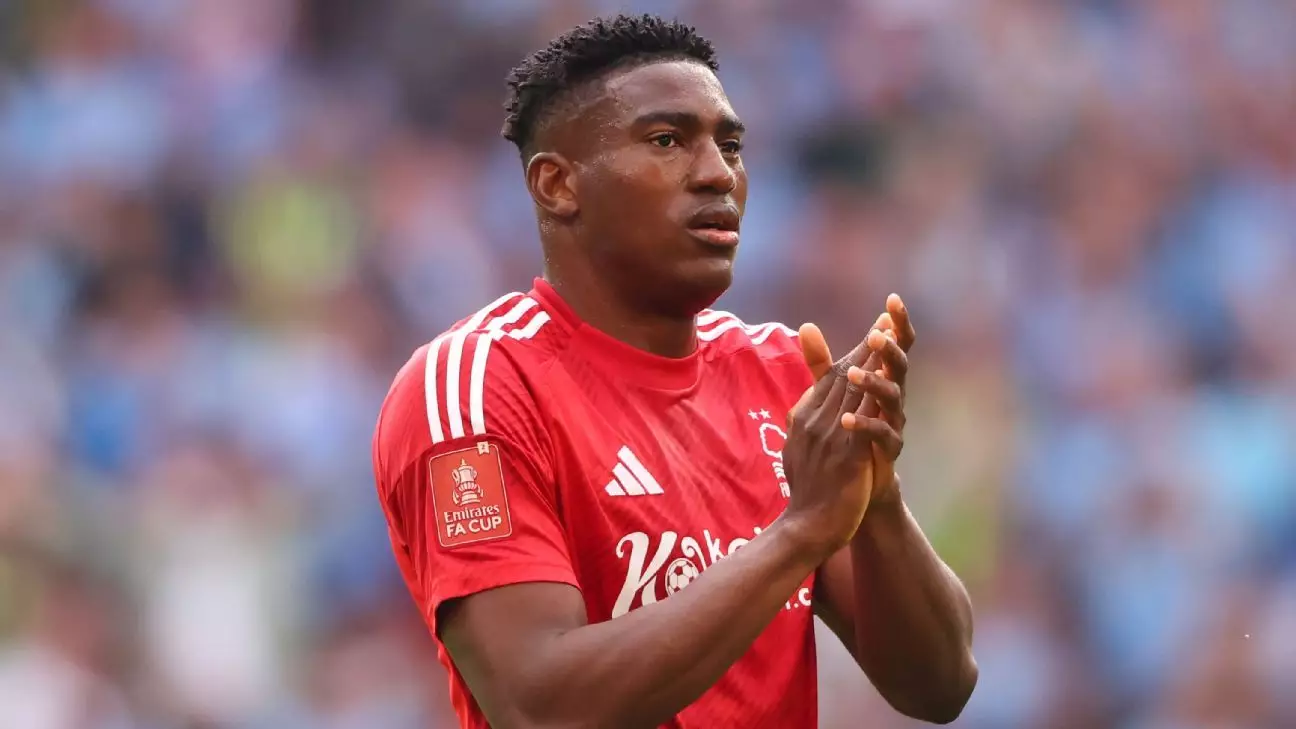In a shocking turn of events that left the football community on edge, Nottingham Forest’s promising striker Taiwo Awoniyi was placed in an induced coma following emergency surgery for a severe abdominal injury. This incident not only speaks volumes about the fragility of athletic careers but also casts a glaring light on the relationships and tensions that exist between players, coaches, and club owners.
The Incident: A Collision and Its Aftermath
Awoniyi’s injury occurred dramatically during a match against Leicester City, wherein he collided with the goal frame shortly after coming on as a substitute. This moment of unscripted violence brought about more than just a physical injury; it revealed vulnerabilities in communication and management within the team. Following the injury, there was a heated discussion between Forest’s owner, Evangelos Marinakis, and head coach Nuno Espirito Santo, indicating that the stakes of the game extend far beyond just winning or losing. Each decision in a match can have dire consequences—a reality no one truly acknowledges until a player’s health is placed in jeopardy.
This incident raises questions. How effectively are medical personnel integrated into game-day decisions? Should players have the final say about their ability to continue in the face of injury? Awoniyi reportedly signaled he could keep playing, but this decision came back to haunt the team as he struggled with discomfort throughout the match. The consequences were felt not just on the pitch but in the emotional landscape of the team under pressure to secure a Champions League spot.
Marinakis’ Frustration: A Sign of Caring or Mismanagement?
Marinakis’s reaction post-game was one of “deep care and emotional investment,” according to a club statement. His decision to step onto the pitch during such a critical moment emphasizes a protective instinct—a willingness to be present in times of crisis. But this also raises eyebrows regarding whether his emotional response reflects a well-balanced connection or a chaotic approach to leadership in high-stress situations. Is this the kind of ownership that serves players well, or does it hint at deeper issues regarding authority and control?
The critical interactions between Marinakis and Espirito Santo echoed their frustrations and highlighted areas where lines of communication broke down. In such moments, what is needed is a united front, a solid framework of medical protocol, and a bond of trust that allows players to express their needs without hesitation. Awoniyi’s situation has underscored that in football, the emotional climate is as crucial as tactical prowess.
Impact on the Team’s Aspirations
With two matches remaining in the Premier League season and Nottingham Forest sitting just outside a Champions League qualification spot, the club faces an urgent challenge. The absence of a key player like Awoniyi is not merely a tactical loss—it could undermine team morale. How the players and coaching staff manage this situation could define their season and set the tone for future campaigns.
As the team battles both physical and mental obstacles, they must navigate the emotional fallout from Awoniyi’s injury while striving to maintain peak performance levels. What strategies will they employ to cope with potential anxiety, fear, and uncertainty because of this health scare?
Looking Forward: A Club at a Crossroads
As we await updates on Awoniyi’s recovery, this incident serves as a formidable reminder of the fragility of life as an athlete and the profound interconnectedness of individual well-being and team dynamics. Nottingham Forest stands at a crossroad, not only in terms of league standings but also regarding how they handle their most prized asset—their players.
The situation calls for introspection. Will this event catalyze changes in communication protocols between medical staff and coaching personnel? Can both parties find a balance that respects the player’s immediate needs while ensuring the competitive objectives of the club? The answer to these questions will shape not only the future of Nottingham Forest but could also influence how other clubs approach player welfare and management in this high-stakes arena. In this closed-loop world of football, will empathy triumph over ambition? The entire footballing world watches and waits.

